Related Research Articles
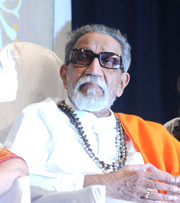
Bal Keshav Thackeray, also known as Balasaheb Thackeray, was an Indian cartoonist and politician who founded the Shiv Sena, a right-wing pro-Marathi and Hindu nationalist party active mainly in the state of Maharashtra.
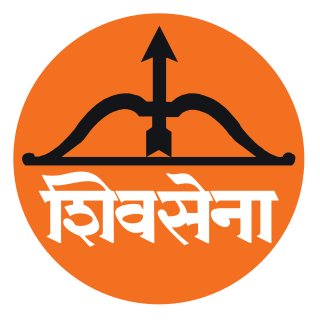
Shiv Sena is a right-wing Marathi regionalist and Hindu ultranationalist political party in India founded in 1966 by Bal Thackeray. Currently led by Eknath Shinde, this party is the ruling party of the Indian state of Maharashtra since 2019. Shiv Sena's election symbol is the Bow and Arrow. It uses the saffron colour in its flag and a image of a roaring tiger.

A urinal is a sanitary plumbing fixture for urination only. Urinals are often provided in public toilets for male users in Western countries. They are usually used in a standing position. Urinals can be with manual flushing, automatic flushing, or without flushing, as is the case for waterless urinals. They can be arranged as single sanitary fixtures or in a trough design without privacy walls. Urinals designed for females also exist but are rare. It is possible for females to use stand-up urinals using a female urination device.
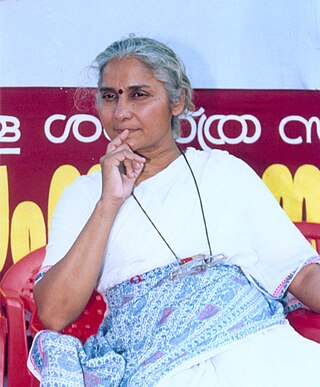
Medha Patkar is an Indian Social activist working on social issues for tribals, dalits, farmers, labourers and women facing injustice in India. She is an alumna of TISS, a premier institute of social science research in India.

Potty parity is equal or equitable provision of public toilet facilities for females and males within a public space.

Unisex public toilets are public toilets that are not separated by gender or sex.

A female urination device (FUD), personal urination device (PUD), female urination aid, or stand-to-pee device (STP) is a device that can be used to more precisely aim the stream of urine while urinating standing upright. Variations range from basic disposable funnels to more elaborate reusable designs. Personal urination devices have increased in popularity since the 1990s. They are used for outdoor occupations & recreation, gender affirmation/safety, and medical reasons.

A female urinal is a urinal designed for the female anatomy to allow for ease of use by women and girls. Different models enable urination in standing, semi-squatting, or squatting postures, but usually without direct bodily contact with the toilet. Sitting models also exist, and are designed for body contact with the urinal.

Balwant Moreshwar Purandare, popularly known as Babasaheb Purandare, was an Indian writer of books and plays from Maharashtra, India. His works are mostly based on the life of Chatrapati Shivaji Maharaj, the 17th-century founder of the Maratha Empire; as a result he is called Shiv-Shahir. He is mostly known for his popular play on Shivaji, Jaanta Raja. Purandare also studied the history of the Peshwas of Pune. In 2015, he was awarded the Maharashtra Bhushan Award, Maharashtra's highest civilian award. He was awarded the Padma Vibhushan, India's highest second-civilian award on 25 January 2019.

Poonam Mahajan is an Indian politician and a former Member of Parliament, Lok Sabha from Mumbai North Central, Constituency, Maharashtra. She is a member of the Bharatiya Janata Party (BJP). She has served as the National President of Bharatiya Janata Yuva Morcha (BJYM), the youth wing of the BJP, from December 2016 to September 2020. Mahajan was the President of the Basketball Federation of India, the first female to hold this position. In addition, she currently serves as Chair of the Maharashtra State Animal Welfare Board.

Fatima Sana Shaikh is an Indian actress, who works in Hindi films. Shaikh appeared as a child artist in such films as Chachi 420 (1997) and One 2 Ka 4 (2001). In 2016, she portrayed wrestler Geeta Phogat in the top-grossing sports film Dangal. She has since starred in the streaming projects Ludo (2020), Ajeeb Daastaans (2021) and Modern Love Mumbai (2022), and portrayed Indira Gandhi in the biographical drama Sam Bahadur (2023).
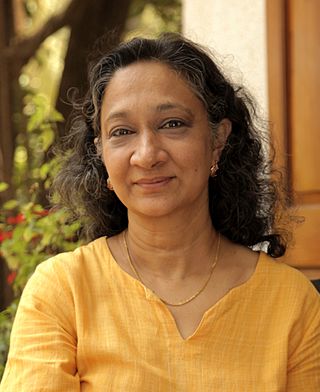
Sumaira Abdulali, born 22 May 1961 is an environmentalist from Mumbai, India, founder of the NGO Awaaz Foundation and convenor of the Movement against Intimidation, Threat and Revenge against Activists (MITRA). She was co-chairman of the Conservation Subcommittee and honorary secretary of Asia's oldest and largest environmental NGO, the Bombay Natural History Society, and was a Governing Council Member between 2008 and 2021.
Kokilaben Dhirubhai Ambani Hospital is a tertiary-care hospital in Four Bungalows, Mumbai, India. The hospital is named after Kokilaben Ambani, wife of industrialist Dhirubhai Ambani, who was the founder of Reliance Industries.

Mithan Jamshed Lam (1898–1981) was an Indian lawyer, social activist and the Sheriff of Mumbai. She was the first Indian woman barrister and the first Indian woman lawyer at the Bombay High Court. She was a member of the All India Women's Conference and served as its president in 1961–62. The Government of India awarded her the third highest civilian honour of the Padma Bhushan, in 1962, for her contributions to society.
Rais Shaikh is an Indian politician from Mumbai, India. He is a member of Maharashtra Legislative Assembly representing the constituency of Bhiwandi East. He has been the Municipal Councilor and also the Group Leader of the Samajwadi Party. He contested and won the BMC elections from Govandi in 2012 and Nagpada in 2017. Shaikh was also amongst the top 10 corporators in Mumbai as per a survey by Mumbai Mirror.
Asheer Akhtar is an Indian professional footballer who plays as a defender for Indian Super League club NorthEast United.
Abha Singh is an Indian activist and advocate currently practicing in the High Court of Judicature at Bombay. Her activism has focused on women's rights, gender equality, and justice.
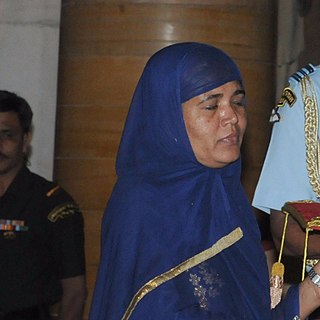
Mumtaz née Maqsood Ahmed Kazi also popularly known as Mumtaz M. Kazi is an Indian train engineer who is also regarded as the first Indian woman to drive a diesel engine train. In fact, she is also Asia's first woman locomotive driver after Surekha Yadav. She was awarded the prestigious Nari Shakti Puraskar in March 2017 coinciding the International Women's Day from the then Indian President Pranab Mukherjee.

The pee curl is a public urinal, many of which are found in the centre of Amsterdam. They originated at the end of the 19th century, and were first installed by the Public Works Department of Amsterdam.

madamePee is a mobile female urinal, without contact and without water supply. It is designed to be used at public events such as concerts or music festivals, but also in more durable situations such as construction sites, public gardens, etc.
References
Citations
- 1 2 Sangameshwaran 2016.
- 1 2 3 4 5 6 Sirohi 2015.
- 1 2 3 4 5 The Hindu 2015.
- 1 2 Pinto 2014.
- ↑ Andhale 2013.
- 1 2 Yardley 2012.
- 1 2 Shaikh 2015.
- ↑ Andhale 2015.
- ↑ The Hindustan Times 2016.
- ↑ Purandare 2016.
- ↑ Andhale 2016.
Bibliography
- Andhale, Santosh (20 November 2015). "BBC recognition for the cause, not for me, says 'Right to Pee' activist". Daily News and Analysis . Mambai, India. Archived from the original on 25 January 2016. Retrieved 7 December 2016.
- Andhale, Santosh (6 April 2016). "Right to Pee activists plan to extend campaign across state". Daily News and Analysis . Mambai, India. Archived from the original on 20 October 2016. Retrieved 7 December 2016.
- Andhale, Santosh (18 May 2013). "Right-to-pee activists to follow China model, Occupy Men's Toilet". Daily News and Analysis . Mambai, India. Archived from the original on 7 December 2016. Retrieved 7 December 2016.
- Pinto, Richa (17 August 2014). "Railways have bad track record of dirty toilets at stations". The Times of India . Mumbai, India. Archived from the original on 21 August 2014. Retrieved 7 December 2016.
- Purandare, Vrushali (22 November 2016). "Women in queues bemoan lack of loos". The Asian Age . Delhi, India. Archived from the original on 7 December 2016. Retrieved 7 December 2016.
- Sangameshwaran, Prasad (14 April 2016). "A sibling reunion story 29 years in the making". The Hindu . Chennai, India. Archived from the original on 7 December 2016. Retrieved 7 December 2016.
- Shaikh, Zeeshan (21 November 2015). ""Right to Pee" activist Mumtaz Shaikh makes it to BBC's 100 most inspirational women". India.com. Mumbai, India: Essel Group. Archived from the original on 4 August 2016. Retrieved 7 December 2016.
- Sirohi, Ashita (4 September 2015). "Once Beaten and Abused, Today This 'Daughter of Maharashtra' is Fighting for Women's Right to Pee". The Better India. Bangalore, India. Archived from the original on 8 May 2016. Retrieved 7 December 2016.
- Yardley, Jim (14 June 2012). "In Mumbai, a Campaign Against Restroom Injustice". The New York Times . New York City, New York. Archived from the original on 4 August 2016. Retrieved 7 December 2016.
- "Addressing an urgent call". The Hindu . Chennai, India. 30 November 2015. Retrieved 7 December 2016.
- "Richest civic body, but a poor spender". The Hindustan Times . New Delhi, India. 2 February 2016. Archived from the original on 4 February 2016. Retrieved 7 December 2016.